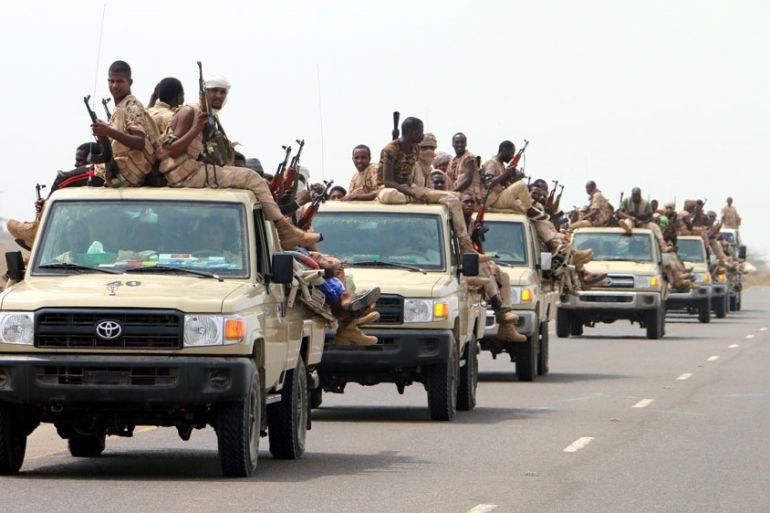Four UAE soldiers killed in assault on Yemen’s Hudaida
The four were killed during a Saudi-UAE military attack against Iranian-aligned Houthi rebels in the port city.

Four Emirati soldiers were killed during an assault on Yemen’s port city of Hudaida on Wednesday, the General Command of the UAE’s armed forces said.
“The four were martyred while carrying out their national duties during operation ‘Restoring Hope’ alongside the Arab coalition in support of legitimacy in Yemen,” UAE’s WAM news agency said.
These were identified as Lieutenant Khalifa Saif Said al-Khatri, Ali Mohammed Rashed al-Hassani, Sergeant Khamis Abdullah Khamis al-Zayudi and First Corporal Obeid Hamdan Said al-Abdouli.
In September 2015, 45 troops from the UAE were killed in Yemen when a missile struck an ammunition depot.
Earlier in the day, Saudi Arabia and the United Arab Emirates launched an assault on Yemen’s third largest city, in the biggest battle in the three-year war between a Saudi-backed coalition and Iranian-aligned Houthi rebels.
The air attacks on Wednesday morning targeting Houthi positions are supported by ground operations by Yemeni troops south of the Red Sea port, the internationally recognised Yemeni government-in-exile said in a statement.
The exiled government “has exhausted all peaceful and political means to remove the Houthi militia from the port of Hudaida,” it said in a statement.
|
|
“The liberation of Hudaida port is a turning point in our struggle to recapture Yemen from the militias that hijacked it to serve foreign agendas,” the statement added.
“The liberation of the port is the start of the fall of the Houthi militia and will secure marine shipping in Bab al-Mandab strait and cut off the hands of Iran, which has long-drowned Yemen in weapons that shed precious Yemeni blood.”
The Red Sea port is the only port under Houthi control, situated about 150km southwest of the capital, Sanaa.
According to Dubai-based Al Arabiya, Yemeni troops have gained control of the city’s southern district of Nekheila.
The Hudaida port is crucial for the flow of food supplies into a country that is on the brink of famine.
Jolien Veldwijk, acting director for Care International in Yemen, told Al Jazeera that the port of Hudaida is crucial for aid agencies to be able to do their work.
“More than two-thirds of the people of Yemen count on the food that is imported through the port of Hudaida,” Veldwijk said.
“Even before the offensive on Hudaida started, already 8 million Yemenis were at risk of famine and we really expect this number to increase rapidly, even if the port is closed for one day.”
“There are other ways [to get food imports into the country] but those ports don’t have the size to handle the size of imports needed to feed the people of Yemen … They’re alot smaller and they can only maybe handle 30 percent of what is needed.”
Riyadh and Abu Dhabi maintain that the port is being used to smuggle weapons.
The assault comes following the expiry of a deadline set by the UAE for the Houthis, who hold Sanaa, to hand over the port that has been under their control for years.
UN warnings
With logistical support from the US, the Saudi-led coalition has been carrying out attacks inside Yemen since March 2015, killing at least 10,000 people, in an attempt to reinstate the internationally recognised government of President Abu-Rabbu Mansour Hadi.
|
|
For the last few weeks, the UN had been trying to broker a deal in a bid to avert the attack, which it fears would further hinder Yemenis’ access to food, fuel and medicine – worsening the world’s most urgent humanitarian crisis.
The UN and the West blame Iran, saying they have supplied the Houthis with weapons from assault rifles to the ballistic missiles they used to fire into Saudi Arabia, including the capital, Riyadh, in previous months.
About 600,000 people live in and around Hudaida, and “as many as 250,000 people may lose everything – even their lives” in the assault, according to the UN.
It also says Hudaida has the largest number of sick people in Yemen with more than 70 percent of its population, especially children, at risk of malnutrition.
The war in Yemen has displaced 2 million more and helped spawn a cholera epidemic.